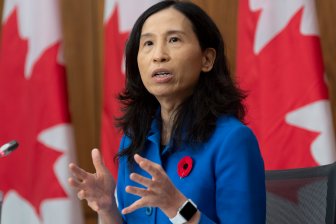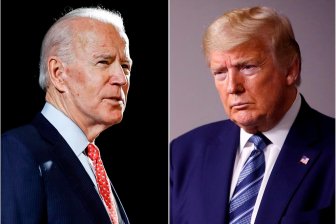Business
Hesitancy over a COVID-19 vaccine may threaten public health – Global News
Midway into November and well into the second wave of the coronavirus pandemic, health experts are increasingly worried about public mistrust over vaccines, and by the lack of a clear communication strategy to address the many questions being asked by Canadians about a vaccine for COVID-19.
Karyn Methven, a cancer survivor, is terrified of contracting COVID-19. “Gosh, this is really urgent,” says Methven, of Delta, BC. “We’ve hit the 10-thousand mark now in Canada, you know. Ten thousand deaths.”
Britt Bright was sick for nearly six months during an influenza pandemic in the 1950s. It left her with permanent lung damage. “I would jump for the COVID [vaccine],” says Bright, a retired psychiatrist from Maple Ridge, B.C.
Courtney Vasquez, a mother of two, says she wants to “wait a few years, see how it plays out,” referring to the development of a vaccine for COVID-19.
These are some of the voices from a town hall recently convened for Global News: The New Reality, to gauge Canadians’ views on a potential vaccine for coronavirus.

Nine Canadians spoke with Global News’ Carolyn Jarvis (top left), offering a snapshot of attitudes with respect to a potential vaccine for COVID-19.
Carolyn Jarvis / Global News
Nine Canadians offered their views on a potential vaccine for COVID-19. They were among thousands of people who wrote to Global News about the topic. Their comments, along with new polling data, also confirm a disturbing trend emerging around COVID-19: growing hesitancy over a potential vaccine.
“We found that most people are OK with the idea of getting vaccinated,” says Steven Taylor, a professor in the Department of Psychiatry at the University of British Columbia, who has researched vaccine hesitancy.
“But the number of people who are becoming hesitant seems to be rising.”
It’s still likely months before scientists complete clinical trials on potential COVID-19 vaccines, and public opinion could change in the meantime.

While Health Canada says that Canadians should have confidence in the process, the federal department is still working on a plan with the provinces to address misinformation, confusion and unanswered questions from the population.
That messaging plan hasn’t rolled out yet, says Dr. Supriya Sharma, the federal department’s chief medical advisor, “but it will be coming out fairly, fairly soon.”
It isn’t clear whether this will be soon enough.
Slim majority willing to take vaccine when available
According to a survey carried out for Global News between October 23-26 by the polling firm Ipsos, just 54 per cent of the Canadian public is willing to take a vaccine as soon as they can. Of that figure, only 22 per cent feel strongly about taking a vaccine right away.
The poll also found that just 61 per cent of respondents support mandatory vaccination for COVID-19, down from 72 per cent who supported a mandatory vaccination program just four months ago.
“This vaccine […] is going to honestly be a sign of how much we trust our doctors, how much we trust our government and our politicians, and how much we trust the media on this,” according to Serena Crowder, a mother of four who spoke at the Global’s town hall, from Georgina, Ont.
Taylor from UBC says public health authorities should have launched a communications plan about vaccines months ago.
“We knew this was going to be a problem,” he says.
Rumour cost $500 million
Heidi Larson has travelled the world, working for the United Nations, fighting rumours that vaccines are somehow harmful.
She warns that a failure to anticipate and address doubts and misinformation could have disastrous consequences.
“The most dramatic example that I saw was just a rumour in Northern Nigeria, driven by political distrust,” says Larson, the founding director of the Vaccine Confidence Project, a research group based in London, England.
She says this rumour triggered resistance to a vaccination campaign against polio in Nigeria. It allowed the disease to spread through 20 countries and “cost the global polio program $500 million to reset the clock,” she says.
‘Operation Warp Speed’
Taylor also says that public officials should be careful about how they describe or label new vaccine projects.
“If you’re going to call your vaccine development program something like ‘Operation Warp Speed,’ which is the name of the program in the United States, that implies that things have been rushed,” Taylor says.
Instead, he said governments should emphasize the safety of the process, as opposed to its speed. “Vaccination development and dissemination programs with more reassuring titles would be more likely to engage the public trust (e.g., calling the program ‘Operation Due Diligence’ instead of ‘Operation Warp Speed’),” he wrote, in a recently co-authored journal paper.
Canada has one of the strongest regulatory systems in the world for developing and approving new vaccines.
Under this system, three federal scientific teams review a vaccine prior to approving or rejecting it. Sharma, from Health Canada, says one team looks at pre-trial research on animals, a second team reviews human clinical trials, and a third team reviews the manufacturing process.
Sharma also notes that the department’s review of potential COVID-19 vaccines will be “the same as with any other vaccine.”
So if the department determines a vaccine candidate doesn’t mean the standards, Health Canada will not approve it, she explains.
“There’s a lot of information that’s not accurate,” Sharma says. “There’s just such a volume of information coming at people. I think it’s awesome and challenging to find out what’s trustworthy information, versus something that people are just sending around.”
Values-based approach
Saad Omer, director of Yale University’s Institute for Global Health, warns that governments should not assume people will take the vaccine.
“There was this naïve belief in the spring that all of a sudden people will start accepting this vaccine because everyone is talking about [COVID-19],” says Omer, the director of Yale University’s Institute for Global Health.
Whether dealing with vaccine hesitancy or climate change skepticism, the challenge for communicators is to reinforce the message that the science is sound, but also to meet people where they are at in terms of their values, Omer explains.
“You can’t change people’s values, and you shouldn’t try to change people’s values. But you can speak to people’s values,” Omer said.

Pharma pledge
The pharmaceutical industry is also taking steps to boost public confidence in their efforts. In September, the CEOs of nine pharmaceutical companies signed a pledge to adhere to accepted scientific standards in the hunt for the vaccine.
“We’re not cutting corners at all. We’re taking our time, and that’s why the vaccine is not available right now, because it takes time,” Jean-Pierre Baylet, general manager of Sanofi Pasteur Canada, told Global News’ The New Reality.
Whatever findings the pharmaceutical companies come up with in clinical trials will ultimately need to be shared with Health Canada for scrutiny and review.
Read more:
Canada must ‘immunize’ public against misinformation before COVID-19 vaccine arrives: Tam
“I understand why there’s some hesitation,” says Dr. Sharma, the medical advisor at Health Canada. But, she adds, “we have a very strong system of review […] no vaccine will be sent out for the Canadian public unless it gets authorized by Health Canada, and they should have confidence in the system.”
Shifting the focus
At the moment, billions are being invested in developing a vaccine. But, says Yale’s Saad Omer, a coordinated public education campaign is falling by the wayside.
“This is a substantial public health catastrophe,” he says. “And the moment should be matched by the size and the reach of a systematic public health campaign that clarifies the vaccine development and approval process, that talks about what is known and what is unknown.”

Populist politicians around the world, alongside a few celebrities, are filling the void with misleading information alongside all sorts of conspiracy theories.
It isn’t just the public at large, either, that is vaccine-hesitant. Mistrust over a coronavirus vaccine also runs through the health care community, amplifying the communication challenge even more.
“Health care providers,” says Omer, “need information and training in communicating around this vaccine. That’s not being done in most countries in the world, and that’s one of the things that keeps me up at night.”
Both Omer and Heidi Larson, of the Vaccine Confidence Project, agree that the way to instill confidence is through engagement at the community level, with voices that people can trust.
“It’s about caring about people,” Larson says. “It’s about caring about their emotions and feelings, and why they feel like they’re hesitant, because that’s a big problem right now.”
At the same time, she says it’s a “huge opportunity” to set the record straight on vaccines and to instill confidence.
“If we get this wrong, that will not be forgotten.”
See this and other original stories about our world on The New Reality airing Saturday nights on Global TV, and online.
© 2020 Global News, a division of Corus Entertainment Inc.
Business
Gildan replacing five directors ahead of AGM, will back two Browning West nominees – Yahoo Canada Finance


MONTREAL — Gildan Activewear Inc. is making changes to its board of directors in an attempt to head off a move by an activist shareholder looking to replace a majority of the board at its annual meeting next month.
U.S. investment firm Browning West wants to replace eight of Gildan’s 12 directors with its own nominees in a move to bring back founder Glenn Chamandy as chief executive.
Gildan, which announced late last year that Chamandy would be replaced by Vince Tyra, said Monday it will replace five members of its board of directors ahead of its annual meeting set for May 28.
It also says current board members Luc Jobin and Chris Shackelton will not run for re-election and that it will recommend shareholders vote for Karen Stuckey and J.P. Towner, who are two of Browning West’s eight nominees.
ADVERTISEMENT
The new directors who will join the Gildan board on May 1 are Tim Hodgson, Lee Bird, Jane Craighead, Lynn Loewen and Les Viner. They will replace Donald Berg, Maryse Bertrand, Shirley Cunningham, Charles Herington and Craig Leavitt.
Hodgson, who served as chief executive of Goldman Sachs Canada from 2005 to 2010, is expected to replace Berg as chair.
“I look forward to working with this highly qualified board and management team to realize the full benefits of Vince’s ambitious yet realistic plan to drive growth by enhancing the Gildan sustainable growth strategy,” Hodgson said in a statement.
“The refreshed board and I fully believe in Vince and his talented team as well as Gildan’s leading market position and growth prospects.”
Gildan has been embroiled in controversy ever since it announced Chamandy was being replaced by Tyra.
The company has said Chamandy had no credible long-term strategy and had lost the board’s confidence. But several of Gildan’s investors have criticized the company for the move and called for his return.
Those investors include the company’s largest shareholder, Jarislowsky Fraser, as well as Browning West and Turtle Creek Asset Management.
In announcing the board changes, Gildan said it met with shareholders including those who Browning West has counted as supportive.
“Our slate strikes a balance between ensuring the board retains historical continuity during a period of transition and provides fresh perspectives to ensure it continues to serve its important oversight function on behalf of all shareholders,” the company said.
Gildan said last month that it has formed a special committee of independent directors to consider a “non-binding expression of interest” from an unnamed potential purchaser and contact other potential bidders.
But Browning West and Turtle Creek have said the current board cannot be trusted to oversee a sale of the company.
The company said Monday that there continues to be external interest in acquiring the company and the process is ongoing.
This report by The Canadian Press was first published April 22, 2024.
Companies in this story: (TSX:GIL)
The Canadian Press
Business
Ottawa puts up $50M in federal budget to hedge against job-stealing AI – CP24


Anja Karadeglija, The Canadian Press
Published Sunday, April 21, 2024 4:02PM EDT
Last Updated Sunday, April 21, 2024 4:04PM EDT
Worried artificial intelligence is coming for your job? So is the federal government — enough, at least, to set aside $50 million for skills retraining for workers.
One of the centrepiece promises in the federal budget released Tuesday was $2.3 billion in investments aiming to boost adoption of the technology and the artificial intelligence industry in Canada.
But tucked alongside that was a promise to invest $50 million over four years “to support workers who may be impacted by AI.” Workers in “potentially disrupted sectors and communities” will receive new skills training through the Sectoral Workforce Solutions Program.
“There is a significant transformation of the economy and society on the horizon around artificial intelligence,” said Joel Blit, an associate professor of economics at the University of Waterloo.
Some jobs will be lost, others will be created, “but there’s going to be a transition period that could be somewhat chaotic.”
While jokes about robots coming to take jobs predate the emergence of generative AI systems in late 2022, the widespread availability of systems like ChatGPT made those fears real for many, even as workers across industries began integrating the technology into their workday.
In June 2023, a briefing note for Finance Minister Chrystia Freeland warned the impact of generative AI “will be felt across all industries and around 40 per cent of all working hours could be impacted.”
“Banking, insurance and energy appear to have higher potential for automation compared to other sectors,” says the note, obtained through access to information and citing information from Accenture.
“This could have substantial impacts on jobs and skills requirements.”
The budget only singles out “creative industries” as an affected sector that will be covered by the program. In February, the Canadian TV, film, and music industries asked MPs for protection against AI, saying the tech threatens their livelihood and reputations.
Finance Canada did not respond to questions asking what other sectors or types of jobs would be covered under the program.
“The creative industries was used as an illustrative example, and not intended as an exclusion of other affected areas,” deputy Finance spokesperson Caroline Thériault said in a statement.
In an interview earlier this year, Bea Bruske, president of the Canadian Labour Congress, said unions representing actors and directors have been very worried about how their likenesses or their work could be used by AI systems. But the “reality is that we have to look at the implication of AI in all jobs,” she said.
Blit explained large language models and other generative AI can write, come up with new ideas and then test those ideas, analyze data, as well as generate computer programming code, music, images, and video.
Those set to be affected are individuals in white-collar professions, like people working in marketing, health care, law and accounting.
In the longer run, “it’s actually quite hard to predict who is going to be impacted,” he said. “What’s going to happen is that entire industries, entire processes are going to be reimagined around this new technology.”
AI is an issue “across sectors, but certainly clerical and customer service jobs are more vulnerable,” Hugh Pouliot, a spokesperson for the Canadian Union of Public Employees, said in an email.
The federal government has used AI in nearly 300 projects and initiatives, new research published earlier this month revealed.
According to Viet Vu, manager of economic research at Toronto Metropolitan University’s the Dais, the impact of AI on workers in a sector like the creative industry doesn’t have to be negative.
“That’s only the case if you adopt it irresponsibly,” he said, pointing out creative professionals have been adopting new digital tools in their work for years.
He noted only four per cent of Canadian businesses are using any kind of artificial intelligence or machine learning. “And so we’re really not there yet for these frontier models and frontier technologies” to be making an impact.
When it comes to the question of how AI will affect the labour market, it’s more useful to think about what types of tasks technology can do better, as opposed to whether it will replace entire jobs, Vu said.
“A job is composed of so many different tasks that sometimes even if a new technology comes along and 20, 30 per cent of your job can be done using AI, you still have that 60, 70 per cent left,” he said.
“So it’s rare that (an) entire occupation is actually sort of erased out of existence because of technology.”
Finance Canada also did not respond to questions about what new skills the workers would be learning.
Vu said there are two types of skills it makes sense to focus on in retraining — computational thinking, or understanding how computers operate and make decisions, and skills dealing with data.
There is no AI system in the world that does not use data, he said. “And so being able to actually understand how data is curated, how data is used, even some basic data analytics skills, will go a really long way.”
But given the scope of the change the AI technology is set to trigger, critics say a lot more than $50 million will be necessary.
Blit said the money is a good first step but won’t be “close to enough” when it comes to the scale of the coming transformation, which will be comparable to globalization or the adoption of computers.
Valerio De Stefano, Canada research chair in innovation law and society at York University, agreed more resources will be necessary.
“Jobs may be reduced to an extent that reskilling may be insufficient,” and the government should look at “forms of unconditional income support such as basic income,” he said.
The government should also consider demanding AI companies “contribute directly to pay for any social initiative that takes care of people who lose their jobs to technology” and asking “employers who reduce payrolls and increase profits thanks to AI to do the same.”
“Otherwise, society will end up subsidizing tech businesses and other companies as they increase profit without giving back enough for technology to benefit us all.”
Business
Honda to build electric vehicles and battery plant in Ontario, sources say – Global News
Honda Canada is set to build an electric vehicle battery plant near its auto manufacturing facility in Alliston, Ont., where it also plans to produce fully electric vehicles, The Canadian Press has learned.
Senior sources with information on the project confirmed the federal and Ontario governments will make the announcement this week, but were not yet able to give any dollar figures.
However, comments Monday from Ontario Premier Doug Ford and Economic Development Minister Vic Fedeli suggest it is a project worth around $14 billion or $15 billion.
Ford told a First Nations conference that there will be an announcement this week about a new deal he said will be double the size of a Volkswagen deal announced last year. That EV battery plant set to be built in St. Thomas, Ont., comes with a $7-billion capital price tag.
Fedeli would not confirm if Ford was referencing Honda, but spoke coyly after question period Monday about the amount of electric vehicle investment in the province.
“We went from zero to $28 billion in three years and if the premier, if his comments are correct, then next week, we’ll be announcing $43 billion … in and around there,” he said.
More on Canada
The Honda facility will be the third electric vehicle battery plant in Ontario, following in the footsteps of Volkswagen and a Stellantis LG plant in Windsor, and while those two deals involved billions of dollars in production subsidies as a way of competing with the United States’ Inflation Reduction Act subsidies, Honda’s is expected to involve capital commitments and tax credits.
Federal Finance Minister Chrystia Freeland’s recent budget announced a 10-per-cent Electric Vehicle Supply Chain investment tax credit on the cost of buildings related to EV production as long as the business invests in assembly, battery production and cathode active material production in Canada.
That’s on top of an existing 30-per-cent Clean Technology Manufacturing investment tax credit on the cost of investments in new machinery and equipment.
Honda’s deal also involves two key parts suppliers for their batteries — cathodes and separators — with the locations of those facilities elsewhere in Ontario set to be announced at a later date.
The deal comes after years of meetings and discussions between Honda executives and the Ontario government, the sources said.
Prime Minister Justin Trudeau, Premier Doug Ford and Honda executives were on hand in March 2022 in Alliston when the Japanese automaker announced hybrid production at the facility, with $131.6 million in assistance from each of the two levels of government.
Around the time of that announcement, conversations began about a larger potential investment into electric vehicles, the sources said, and negotiations began that summer.
Fedeli travelled to Japan that fall, the first of three visits to meet with Honda Motor executives about the project. Senior officials from the company in Japan also travelled to Toronto three times to meet with government officials, including twice with Ford.
During a trip by the Honda executives to Toronto in March 2023, Ontario officials including Fedeli pitched the province as a prime destination for electric vehicle and battery investments, part of a strong push from the government to make Ford’s vision of an end-to-end electric vehicle supply chain in the province a reality.
Negotiations took a major step forward that July, when Ontario sent a formal letter to Honda Canada, signalling its willingness to offer incentives for a battery plant and EV production. Honda Canada executives then met with Ford in November and December.
The latter meeting sealed the deal, the sources said.
Honda approached the federal government a few months ago, a senior government official said, and Freeland led her government’s negotiations with the company.
The project is expected to involve the construction of several plants, according to the source.
— With files from Nojoud Al Mallees in Ottawa.
© 2024 The Canadian Press
-
Business20 hours ago
Honda to build electric vehicles and battery plant in Ontario, sources say – Global News
-



 Science20 hours ago
Science20 hours agoWill We Know if TRAPPIST-1e has Life? – Universe Today
-
Investment24 hours ago
Down 80%, Is Carnival Stock a Once-in-a-Generation Investment Opportunity?
-



 Health17 hours ago
Health17 hours agoSee how chicken farmers are trying to stop the spread of bird flu – Fox 46 Charlotte
-



 Health20 hours ago
Health20 hours agoSimcoe-Muskoka health unit urges residents to get immunized
-



 Investment18 hours ago
Investment18 hours agoOwn a cottage or investment property? Here's how to navigate the new capital gains tax changes – The Globe and Mail
-
News24 hours ago
Can Canada have an effective climate action policy without a carbon tax?
-
Business24 hours ago
Strike averted after tentative agreement reached between TTC, electrical and trades workers










